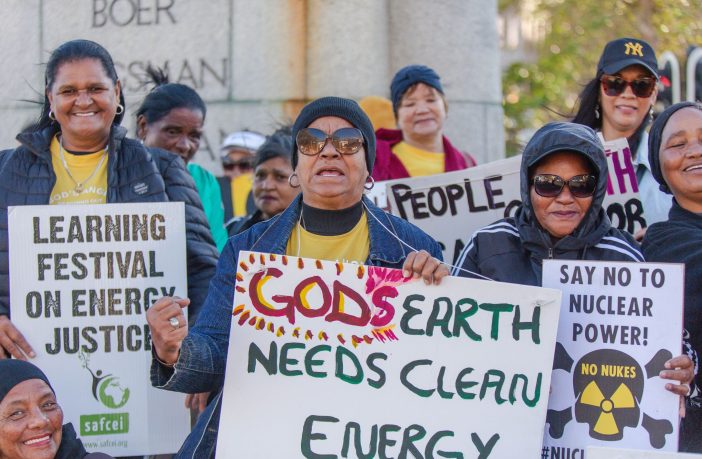- On the eve of South Africa’s Freedom Day, Friday 26 April 2024, the Southern African Faith Communities’ Environment Institute (SAFCEI) – together with Earthlife Africa Johannesburg, Project 90 by 2030, Africa Climate Alliance, Koeberg Alert Alliance, The Green Connection and concerned citizens held a peaceful vigil outside Parliament in Cape Town.
- The vigil marked the 7th Anniversary of the landmark court ruling against a secret, illegal R1-trillion nuclear deal, which many believed would bankrupt the country.
- This day also marks the 38th anniversary of the Chernobyl disaster.
Francesca de Gasparis (Executive Director, SAFCEI) says, “That the court ruling for the South African case date coincides with the anniversary of the Chernobyl disaster should be seen as a cautionary tale of the destructive capability of nuclear energy coupled with the devastating consequences of government secrecy. Today we launched Lessons from the South African Nuclear Court Case a short publication on that historic moment so it is not forgotten and in the public interest.”
Nuclear energy projects in Africa raise significant concerns regarding their economic, environmental, and political ramifications. The exorbitant costs incurred are not only burdensome to current economies but also extend their impact to future generations, passing on debt to taxpayers. Moreover, international funding agreements often compromise national sovereignty and security, while the sector’s historical secrecy fosters corruption and grants undue influence to political elites. Furthermore, the impracticality of nuclear energy in regions with small, unstable grids and water-stressed environments, coupled with its slow construction pace and reliance on extensive resources, underscores the urgency of exploring more immediate and sustainable power generation alternatives.
Makoma Lekalakala (Earthlife Africa Johannesburg) says, “We oppose any new nuclear energy developments in South Africa as planned in the ntegrated Resource Plan (IRP). We see the issue of radioactive waste and its impact on those who are unfortunate enough to live in areas where they may be affected, as a non-negotiable. The legacy of apartheid is still very much a reality for the people living near the nuclear waste facility in Vaalputs Northern Cape – a site which may grow in size and scale, should the Koeberg life extension get the green light.”
In contrast to the protracted timelines and potential risks associated with nuclear energy, renewable energy sources offer a more viable and cost-effective solution for Africa’s energy needs. Embracing renewables not only mitigates environmental concerns but also provides rapid deployment opportunities, creating jobs and bolstering local economies. By prioritising these alternatives, African nations can sidestep the pitfalls of nuclear energy and usher in a brighter, more sustainable energy future, aligned with both economic prosperity and environmental stewardship.
“South Africa needs an Integrated Energy Plan, energy sources that are chosen by the people for the people. This is why we call on South Africans to join us, to make their voices heard and in shaping the country’s energy future! This is why we celebrate the past victories, to show our fellow citizens that when we unite, we can achieve what seems to be impossible. Now is the time for the public to get involved in the country’s energy decisions. Just look at where excluding the people’s voice has gotten us, a debilitating energy crisis that still relies on sources that harm our people and the environment. Together, we can ensure affordability, safety, and reliability, and address energy poverty. This is why we demand transparency from our leaders, so that all South Africans can have a brighter, cleaner future,” concludes de Gasparis.
Author: Bryan Groenendaal















